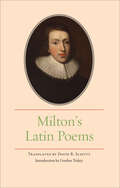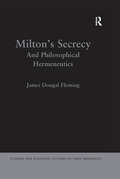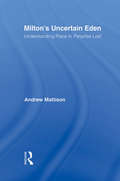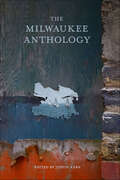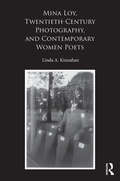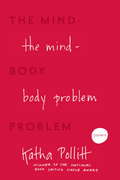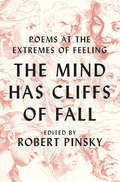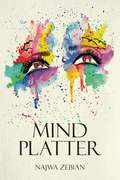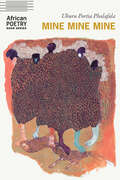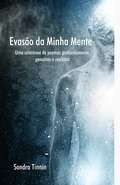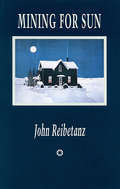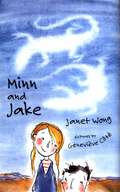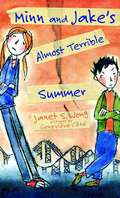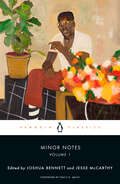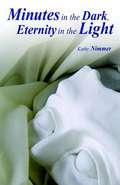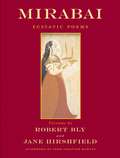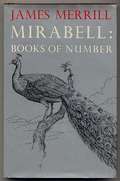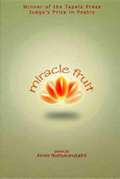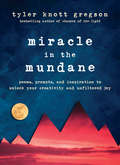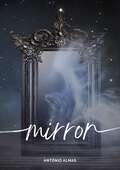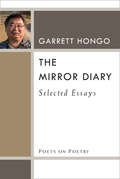- Table View
- List View
Milton, Toleration, and Nationhood
by Elizabeth SauerJohn Milton lived at a time when English nationalism became entangled with principles and policies of cultural, religious, and ethnic tolerance. Combining political theory with close readings of key texts, this study examines how Milton's polemical and imaginative prose intersects with representations of English Protestant nationhood. Through detailed case studies of Milton's works, Elizabeth Sauer charts the fluctuating narrative of Milton's literary engagements in relation to social, political, and philosophical themes such as ecclesiology, exclusionism, Irish alterity, natural law, disestablishment, geography, and intermarriage. In so doing, Sauer shows the extent to which nationhood and toleration can be subjected to literary and historicist inquiry. Her study makes a salient contribution to Milton studies and to scholarship on early modern literature and the development of the early nation-state.
Milton's Latin Poems
by David R. SlavittIn this collection, esteemed poet and translator David R. Slavitt brings to life John Milton’s Latin poetry with deft, imaginative modern English translations.While Milton is recognized as one of the most learned English poets in history, his Latin poetry is less well known. Slavitt’s careful rendering brings Milton’s Latin poems—many written in his late teens—into the present. He keeps true to the style of the originals, showing Milton’s maturing poetic voice and the freedom he found working in Latin. On the Gunpowder PlotO, sly Guy Fawkes, you plotted against your king and the British lords, but did you intend to be kindand make up for your malice in this thing with at least a show of piety? Do we findan intention, perhaps, of sending the members of court up to the sky in a chariot made of firethe way Elijah traveled. Or do I distort the simple wickedness of your desire?Featuring an introduction by Gordon Teskey, this comprehensive English-language collection of Milton’s Latin poems pays due respect to a master. Poetry lovers, Milton fans, and scholars of either will welcome, enjoy, and learn from this work.
Milton's Secrecy: And Philosophical Hermeneutics (Literary and Scientific Cultures of Early Modernity)
by James Dougal FlemingScientific modernity treats interpretation as a matter of discovery. Discovery, however, may not be all that matters about interpretation. In Milton's Secrecy, J. D. Fleming argues that the poetry and prose of John Milton (1608-1674) are about the presentation of a radically different hermeneutic model. This is based on openness within language, rather than on secrets within the world. Milton's representations of meaning are exoteric, not esoteric; recognitive, not inventive. Milton's Secrecy places its titular subject in opposition to the epistemology of modern natural science, and to the interpretative assumptions that science supports. At the same time, the book places Milton within early modern contexts of interpretation and knowledge. Drawing on Renaissance Neoplatonism, Tudor-Stuart ideology, and the Calvinist theory of conscience, Milton's Secrecy argues that the attempt to theorize interpretation without discovery is not unorthodox within early modern English culture. If anything, Milton's hostility to secrecy and discovery aligns him with his culture's ethical and hermeneutic ideal. Milton's Secrecy provides an historical framework for considering the theoretical validity of this ideal, by aligning it with the philosophical hermeneutics of Hans-Georg Gadamer.
Milton's Uncertain Eden: Understanding Place in Paradise Lost (Studies in Major Literary Authors)
by Andrew MattisonThis study describes a variety of ways of thinking about place in the Renaissance and in Paradise Lost. Despite coming from different perspectives, they have in common the idea that the difficulty of the relationship of reciprocity that poetic subjects often expect from their environment destabilizes those subjects’ understanding, not only of environment, but of themselves. The study explores destabilization as it affects aspects of the poem from Adam’s sense of the landscape of Eden and the meaning of the Fall itself, to the relationship the ambiguous landscapes of Paradise Lost create between Adam and Eve, the poet and the reader; all of whom are struggling to make sense of the same problematically described places. To a surprisingly large extent, the description of prelapsarian Eden and the events that go on within it have in common a failed attempt to understand the nature of the surroundings. In observing the centrality and difficultly of this poetic discourse of place, the problem of place is found at the very heart of the Fall.
Milton’s Visual Imagination
by Stephen B. DobranskiCritics have traditionally found fault with the descriptions and images in John Milton's poetry and thought of him as an author who wrote for the ear more than the eye. In Milton's Visual Imagination, Stephen B. Dobranski proposes that, on the contrary, Milton enriches his biblical source text with acute and sometimes astonishing visual details. He contends that Milton's imagery - traditionally disparaged by critics - advances the epic's narrative while expressing the author's heterodox beliefs. In particular, Milton exploits the meaning of objects and gestures to overcome the inherent difficulty of his subject and to accommodate seventeenth-century readers. Bringing together Milton's material philosophy with an analysis of both his poetic tradition and cultural circumstances, this book is a major contribution to our understanding of early modern visual culture as well as of Milton's epic.
The Milwaukee Anthology (Belt City Anthologies)
by Justin KernA collection of essays, art, stories, and poetry that offer a nuanced portrait of Milwaukee in all its hope and hurt, weirdness and wonder.The Milwaukee Anthology presents a rich mosaic of one of America&’s toughest zip codes. With a diverse range of perspectives, authors and artists share honest first-hand stories about Riverwest, Sherman Park, Hmong New Year&’s shows, 7 Mile Fair, the Rolling Mill commemoration, and much more. Edited by Justin Kern, and with more than fifty contributors including Dasha Kelly, Pardeep Kaleka, and Michael Perry, this collection includes stories about: Redlining in the city Painting a community mural in Sherman Park Reflections after the Oak Creek Sikh Temple Shooting The city&’s upstart microbrewing industry The rise of Giannis Antetokounmpo and the Milwaukee Bucks
Mina Loy, Twentieth-Century Photography, and Contemporary Women Poets
by Linda A. KinnahanIn Mina Loy, Twentieth-Century Photography, and Contemporary Women Poets, Linda A. Kinnahan explores the making of Mina Loy’s late modernist poetics in relation to photography’s ascendance, by the mid-twentieth century, as a distinctively modern force shaping representation and perception. As photography develops over the course of the century as an art form, social tool, and cultural force, Loy’s relationship to a range of photographic cultures emerging in the first half of the twentieth century suggests how we might understand not only the intriguing work of this poet, but also the shaping impact of photography and new technologies of vision upon modernist poetics. Framing Loy’s encounters with photography through intersections of portraiture, Surrealism, fashion, documentary, and photojournalism, Kinnahan draws correspondences between Loy’s late poetry and visual discourses of the body, urban poverty, and war, discerning how a visual rhetoric of gender often underlies these mappings and connections. In her final chapter, Kinnahan examines two contemporary poets who directly engage the camera’s modern impact –Kathleen Fraser and Caroline Bergvall – to explore the questions posed in their work about the particular relation of the camera, the photographic image, and the construction of gender in the late twentieth century.
The Mind-Body Problem: Poems
by Katha PollittPollitt now enjoys national fame for her political columns and her personal essays; she gained attention earlier, though, as a poetAntarctic Traveller (1982) won the National Book Critics Circle Award. Twenty-seven years later, this second collection shows her fine ear and eye, urbane tones, attention to the ups and downs of middle age and motherhood, and her debts to Elizabeth Bishop, whose most ardent fans will find Pollitt at her worst derivative, but at her best a wise and worthy heir. Shore Road just rewrites Bishop's Filling Station (somebody/ crew-cuts the crab-grass. . . puts out the plastic lawn chairs). Poems about biblical scenes and characters seem thin compared to Bishop's prodigal son. Yet when Pollitt uses Bishop's careful and careworn tones for autobiography, she achieves wry, urbane retrospect and a power all her own: Old Sonnets, for example, recalls Pollitt's undergraduate poetic ambitions; Always Already considers how the adult writer loses herself in the forest of other works, where culture is a kind of nature,/ a library of oak leaves,/ muttering their foregone oracles. No one is likely to call Pollitt's verse radically new. Yet these poems can rise far above their promptings, as fleeting verse about an urban scene can rise to representative powers: often enough, Pollitt does. (June) Copyright Reed Business Information, a division of Reed Elsevier Inc. All rights reserved.
The Mind Has Cliffs of Fall: Poetry At The Extremes Of Feeling
by Robert PinskyA bold new anthology of poems that contend with the most extreme human emotions, from former Poet Laureate Robert Pinsky. Despair, mania, rage, guilt, derangement, fantasy: poetry is our most intimate, personal source for the urgency of these experiences. Poems get under our skin; they engage with the balm, and the sting, of understanding. In The Mind Has Cliffs of Fall—its title inspired by a Gerard Manley Hopkins poem—acclaimed poet Robert Pinsky gives us more than 130 poems that explore emotion at its most expansive, distinct, and profound. With seven illuminating chapters and succinct headnotes for each poem, Pinsky leads us through the book’s sweeping historical range. Each chapter, with contents chronologically presented from Shakespeare to Terrance Hayes, Dante to Patricia Lockwood, shows the persistence and variation in our states of mind. “The Sleep of Reason” explores sanity and the imagination, moving from William Cowper’s “Lines Written During a Time of Insanity” to Nicole Sealey’s “a violence.” “Grief” includes Walt Whitman’s “When Lilacs last in the Door-yard Bloom’d” and Marie Howe’s “What the Living Do,” and “Manic Laughter” highlights both Lewis Carroll and Martín Espada. Each poem reveals something new about the vastness of human emotion; taken together they offer a sweeping ode to the power of poetry. Guided by “our finest living example of [the American civic poet]” (New York Times), The Mind Has Cliffs of Fall demonstrates how extreme feelings can be complementary and contradicting, and how poetry is not just an expression of emotion, but emotion itself.
Mind Platter
by Najwa Zebian<p><i>Mind Platter</i> is a compilation of reflections on life as seen through the eyes of an educator, student, and human who experienced her early days in silence. It is written in the words of a woman who came from Lebanon to Canada at the age of sixteen and experienced what it was like to have fate push her to a place where she didn't belong. It is written in the voice of every person who has felt unheard, mistreated, misjudged, or unseen. <p>The book contains over 200 one-page reflections on topics we encounter in our everyday lives: love, friendship, hurt, inspiration, respect, motivation, integrity, honesty, and more. Mind Platter is not about the words it contains, but what the reader makes of them. May this book give a voice to those who need one, be a crying shoulder for those who yearn for someone to listen, and inspire those who need a reminder of the power they have over their lives.</p>
Mindscapes: Poems for the Real World
by Richard PeckMindscapes brings together the very best of two centuries of writing on the vicissitudes of altered consciousness.
Mine Mine Mine (African Poetry Book)
by Uhuru Portia PhalafalaMine Mine Mine is a personal narration of Uhuru Portia Phalafala&’s family&’s experience of the migrant labor system brought on by the gold mining industry in Johannesburg, South Africa. Using geopoetics to map geopolitics, Phalafala follows the death of her grandfather during a historic juncture in 2018, when a silicosis class action lawsuit against the mining industry in South Africa was settled in favor of the miners. Phalafala ties the catastrophic effects of gold mining on the miners and the environment in Johannesburg to the destruction of Black lives, the institution of the Black family, and Black sociality. Her epic poem addresses racial capitalism, bringing together histories of the transatlantic and trans-Indian slave trades, of plantation economies, and of mining and prison-industrial complexes. As inheritor of the migrant labor lineage, she uses her experience to explore how Black women carry intergenerational trauma of racial capitalism in their bodies and intersects the personal and national, continental and diasporic narration of this history within a critical race framework.
minha fuga de mentes
by Sondra Tinnin Maria do Carmo Isabel Alves Camacho de AndradeUma coletânea de poemas profundamente genuínos e realistas. Nesta obra Sondra Hicks revela-nos a realidade nua e crua, aspetos positivos da sua vida e outros mais marcantes e negativos. A sua poesia tem um cunho claramente realista e profundamente genuíno e pessoal. Nela são apresentadas as suas vivências, batalhas, conflitos entre outros aspetos. Nesta obrasão também apresentados poemas sobre alguns dos seus familiares e também escritos por alguns dos seus parentes e amigos.
Mining for Sun
by John ReibetanzShortlisted for the 2001 ReLit Awards John Reibetanz is good on grief: "You, mother,/ dying, left what was hard first:/ bones weeping into/ / your veins like flutes, teeth/ vanished on some hospital/ lunch tray" This conjunction of a profound sense of loss with the clearest-eyed observation and acceptance of the entropy of the mundane is characteristic. His poetry has a cultural breadth seldom seen in Canadian writing. He sees the pageantry of the Bayeux tapestry with the eyes of a rural quilter, whose son died beneath a tractor, who would focus on "the spear -- strayed from the main design -/ / that takes a wide-mouthed Tabourer aback,/ and recognize the pain/ of someone caught in the wreck/ of a vast, wayward machine." His lucidity and eloquence have earned the praise of such celebrated poets as Richard Howard and Richard Wilbur. But it is always the heart's music which most informs his poetic craft: and that is what keeps it true.
Minn and Jake
by Janet S. Wong Genevieve CoteA surprising friendshipDo you ever feel like you've somehow lost your true best friend? Minn feels this way. So does Jake. But Minn and Jake have no intention of being friends. Minn's a string bean. Jake's a shrimp. Minn's a girl. Jake's a boy. And in fifth grade, who wants a best friend of the opposite sex? But Minn and Jake are forced together by circumstances, which only strengthen their resistance . . . until Minn takes Jake lizard hunting. There are lots of good ways to choose a friend. This enchanting free-verse novel, accompanied by expressive, humorous black-and-white drawings, proves that sometimes friendship just happens.
Minn and Jake's Almost Terrible Summer
by Janet S. Wong Genevieve CoteThere are a few things / about your best friend that you can only learn / when you see where he's from. Minn knew / that Jake was from the city. But she didn't know / that his grandmother was Korean. That he liked taking bubble baths. / That his brother, Soup, might be an eating champion. / That Jake was a cheater, and that he had a . . . / girlfriend?! There are some things / about your best friend that it's better not / to know. Bouncing free verse and playful black-and-white illustrations combine to make this a charming follow-up to Minn and Jake. Minn and Jake's Almost Terrible Summer is a 2009 Bank Street - Best Children's Book of the Year.
Minor Notes, Volume 1
by Joshua Bennett Jesse McCarthy Tracy K. SmithThe first volume in an anthology series that amplifies the voices of unsung Black poets to paint a more robust picture of our national past, and of the Black literary imagination, with a foreword by Tracy K. SmithA Penguin ClassicJoshua Bennett and Jesse McCarthy repeatedly found themselves struck by the number of exciting poets they came across in long-out-of-print collections and forgotten journals whose work has been neglected or entirely ignored, even by scholars of Black poetry. Minor Notes is an excavation initiative that recovers and curates archival materials from these understudied, though supremely gifted, African American poets of the nineteenth and twentieth centuries, and aims to bridge scholarly interest with the growing general audience who reads, writes, and circulates poetry within that tradition. As Minor Notes clarifies, the work of contemporary Black poets is perhaps best understood through the lens of a long-standing tradition of the poet as witness, as prophetic voice, as communal bard, and as scholar of the everyday and the miraculous. The poets featured in Volume 1 are George Moses Horton, Fenton Johnson, Georgia Douglas Johnson, Henrietta Cordelia Ray, David Wadsworth Cannon Jr., Anne Spencer, and Angelina Weld Grimké.
Minutes in the Dark, Eternity in the Light
by Kathy NimmerThis book contains 140 minute poems: short word pictures of the author's personal journey through vision loss. While every poem is anchored in the theme of blindness, the poems inexplicably rise above that disability label. Many poems are upbeat while others are quite sad. Some share incidents that are well-known by those in his world while others speak of things he has never communicated to another living soul. It is an honest collection of his life experiences tied to the decline of his sight.
Mira Bai
by Usha S. NilssonA monograph in English by Usha S. Nilsson on the medieval Saint-poetess of Rajasthan.
Mirabai: Ecstatic Poems
by Robert Bly Jane HirshfieldMirabai is a literary and spiritual figure of legendary proportions. Born a princess in the region of Rajasthan in 1498, Mira (as she is more commonly known) eschewed the marriage her royal family had arranged for her, celebrating instead her right to independence and intense devotion to Krishna in both her life and poetry. In this collection, Robert Bly and Jane Hirshfield, two of America's best poets, have created lively English versions of Mirabai's poems, using fresh images and energetic rhythms to make them accessible to modern readers.
Mirabell: Books of Number
by James MerrillA collection of poems.<P><P> Winner of the National Book Award
Miracle Fruit
by Aimee NezhukumatathilAs three worlds collide, a mother's Philippines, a father's India and the poet's contemporary America, the resulting impressions are chronicled in this collection of incisive and penetrating verse. The writer weaves her words carefully into a wise and affecting embroidery that celebrates the senses while remaining down-to-earth and genuine.
Miracle in the Mundane: Poems, Prompts, and Inspiration to Unlock Your Creativity and Unfiltered Joy
by Tyler Knott GregsonThe national bestselling author of Chasers of the Light pulls back the curtain on his creative process to share how to unlock creativity and lead a more mindful and compassionate lifeEvery day, Tyler Knott Gregson posts romantic and striking poems on Instagram, enchanting his many fans with his authentic and deeply personal voice. He has a remarkable ability to see the beauty within the seemingly mundane moments of our lives, and above all else this is what keeps his fans coming back for more. Tyler's newest book showcases his inspiring poems, but it also goes one step deeper to reveal his secrets to cultivating this sense of wonder for the world. In this insightful guide, you will learn how to uncover your creativity, find inspiration, and live a life that is "more." Through a series of challenges, you are encouraged to write, draw, photograph, and share as you discover how to see yourself in a new way. Featuring exercises on mindfulness and self-expression as well as a poem for every prompt, this book will broaden your heart and mind to see the miracles hidden all around you.
Mirror
by António AlmasI no longer know how I found you, whether it was during a walk by the sea, or if it was you who wandered the plains seeking the cool shade of my body. I know that a lifetime has passed, that we have been almost everything, although we continue to be almost nothing. Friendship, love, and longing are part of our essence. I have already held your hand, listened to you attentively, idolized you as a goddess, and even dared to kiss your lips. We are like the sea, I the wave that comes and goes, you the mermaid who hides in the deep refuge of solitude and appears on the bow of my ship from time to time. This silence that happens after the thunder is pure meditation, an act of contrition that leads us to balance the euphoria with the calm of being just people, as ordinary as everyone else, almost as complex as many. And here I am, after so many years, once again a tsunami, rising above the broken waves of the sea to bring you to the surface and to kiss your lips once more.
The Mirror Diary: Selected Essays
by Garrett HongoA volume in the Poets on Poetry series, which collects critical works by contemporary poets, gathering together the articles, interviews, and book reviews by which they have articulated the poetics of a new generation. The Mirror Diary tracks the emergence of an original poetic voice and a learned consciousness amid multiple and sometimes competing influences of complex literary traditions and regional and ethnic histories. Beginning with a literary inquiry into the history of Japanese Americans in Hawai`i and California, Garrett Hongo draws on his own history to consider the mosaic of American identities—personal, cultural, and poetic—in the context of a postmodern diaspora. Hongo’s essays attest to the breadth of what he considers his cultural inheritance and literary antecedents, ranging from the poets of China’s T’ang Dynasty to American poets such as Walt Whitman and Charles Olson. He explains free-verse prosody by way of John Coltrane’s jazz; praises his contemporaries, poets David Mura, Edward Hirsch, and Mark Jarman; and acknowledges his mentors, Bert Meyers and Charles Wright. In other pieces he engages with controversies and contestations in contemporary Asian American literature, confronts the politics of race and the legacy of Japanese American internment during World War II, offers paeans to the Hawaiian landscape, and addresses immigrants newly arrived in America with a warm welcome. The Mirror Diary is the work of a poet fully engaged with contemporary politics and poetics and committed to the study and celebration of diverse traditions.

